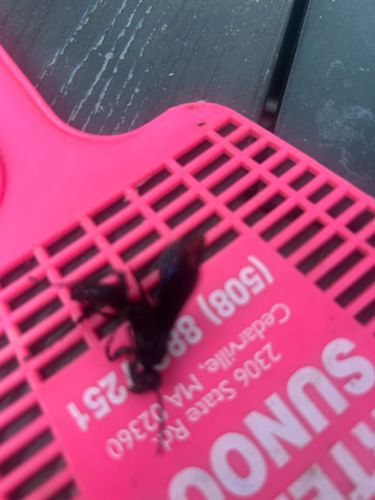Ant or possibly wingless Wasp/Ant mimic
Scientific Name: Indeterminable from the image; could be from Formicidae, Mutillidae, Ichneumonidae, or Braconidae. Specific scientific name cannot be assigned without clearer visual information.
Order & Family: Order: Hymenoptera, Family: Formicidae (Ants) or potentially Mutillidae (Velvet Ants) or Ichneumonidae/Braconidae (Parasitoid Wasps)
Size: Ants vary greatly in size, from less than 1 mm to several centimeters. Wingless wasps and ant mimics also vary, but generally range from a few millimeters to 2-3 cm.

Natural Habitat
The image is too blurry to definitively identify the insect. However, given what appears to be a dark body on a fly swatter, it could potentially be an ant or even a wingless wasp or ant mimic. Ants (Formicidae) live in a wide range of terrestrial habitats, including forests, grasslands, deserts, and urban areas, building nests underground, in wood, or under rocks. Wingless wasps or ant mimics (e.g., some Mutillidae - velvet ants, or certain female Ichneumonidae/Braconidae) also inhabit diverse terrestrial environments, often found on the ground or low vegetation.
Diet & Feeding
Ants are omnivorous, feeding on a wide variety of foods including nectar, seeds, fungi, other insects, and household food scraps. Wingless wasps or ant mimics would have more specific diets depending on their species, often predatory on other insects or larvae.
Behavior Patterns
Typically found on the ground or decaying wood. Can be quite skittish when disturbed and will attempt to run or fly away quickly. They are generally solitary.
Risks & Benefits
Ants can be considered pests when they invade homes, contaminate food, or, in some species, deliver painful bites/stings. Some species can cause structural damage (carpenter ants). Ecologically, ants are beneficial as scavengers, seed dispersers, and predators of other insects. Velvet ants (Mutillidae) deliver an extremely painful sting, hence their common name 'cow killers,' though it's rarely medically significant to humans. They are beneficial for controlling ground-nesting bee and wasp populations. Parasitoid wasps are overwhelmingly beneficial as natural pest control agents, laying their eggs in or on other insects, thus killing them.
Identified on: 8/16/2025